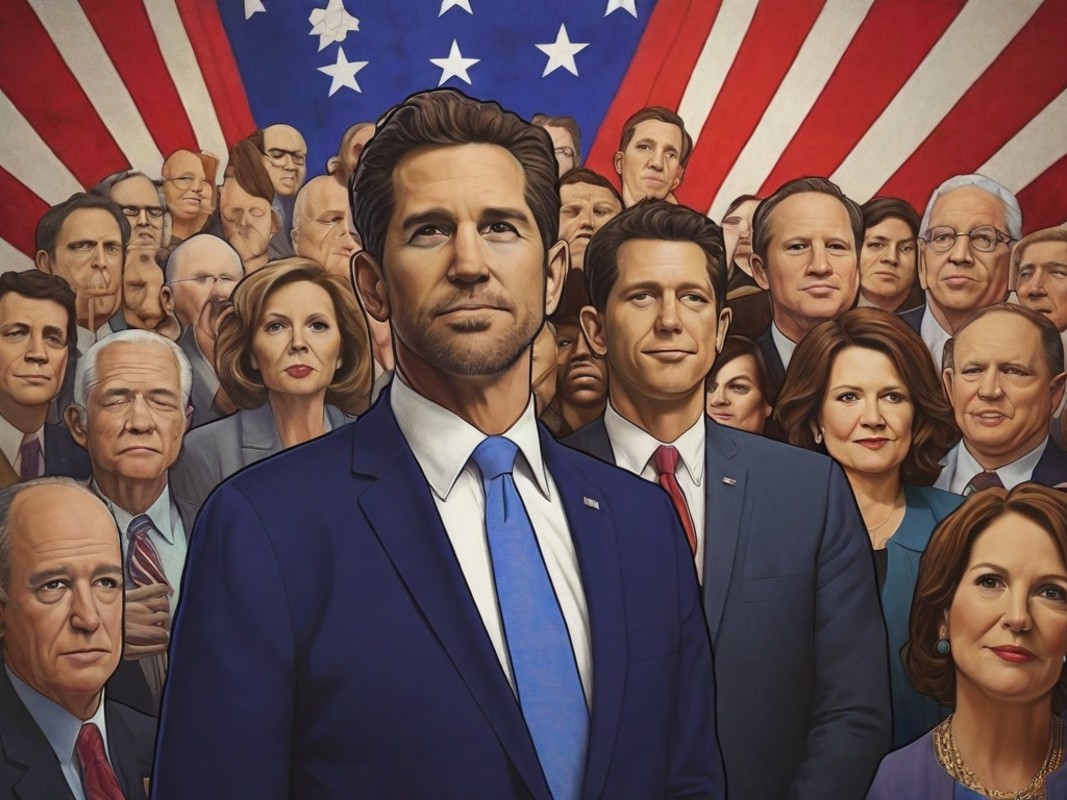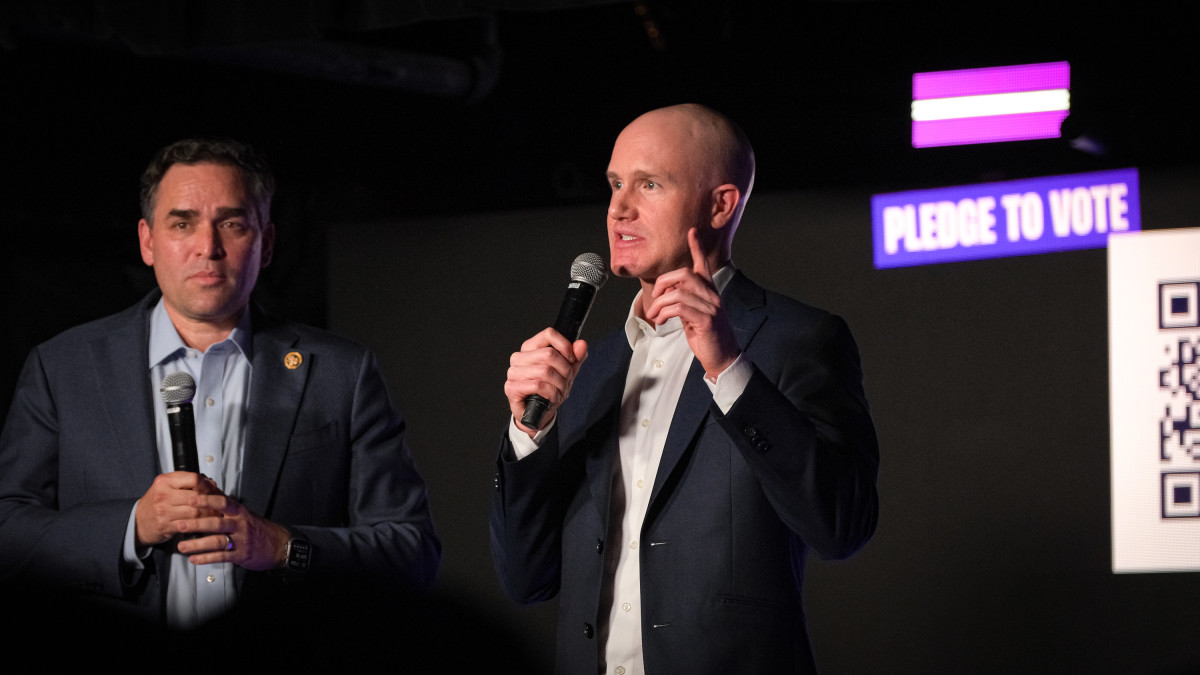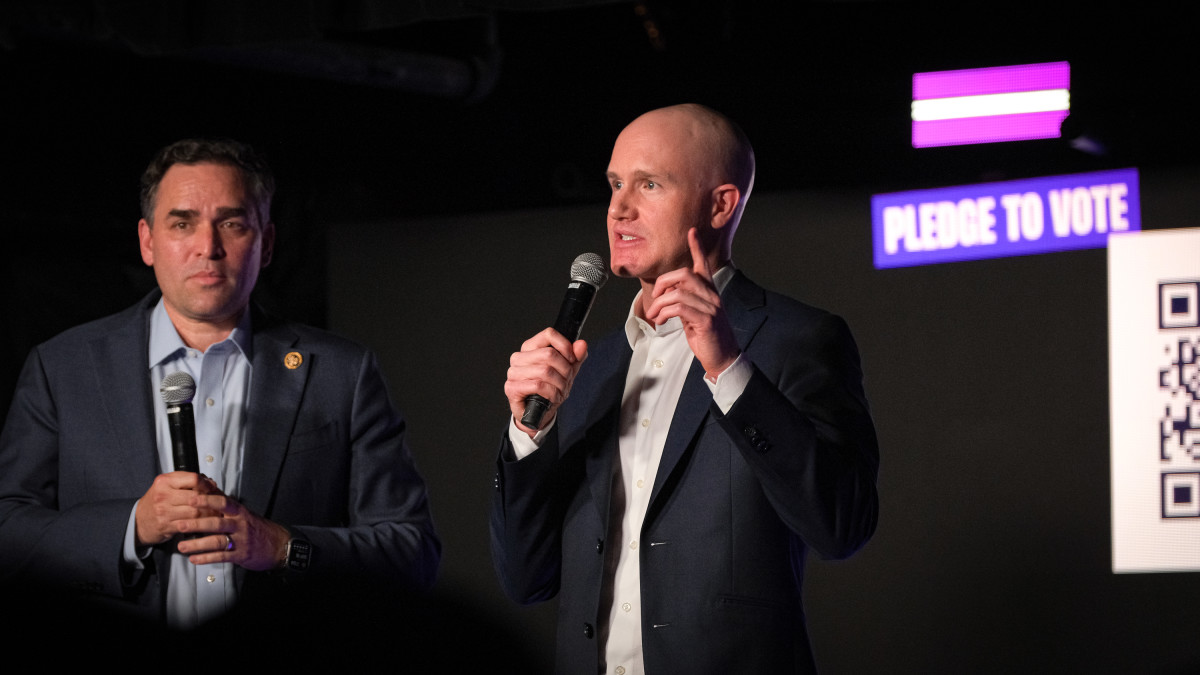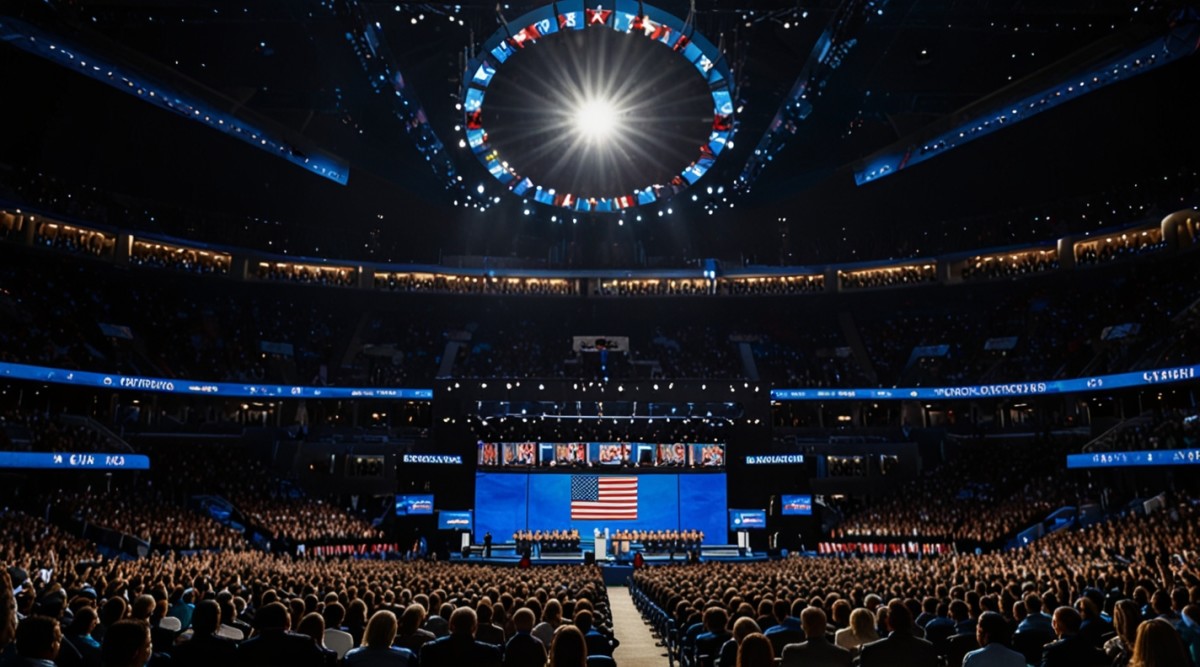Democrats
Elizabeth Warren Proves Democrats Are Still Against Bitcoin
Published
2 months agoon
By
admin

If you were tuned into the Massachusetts Senate debate last night, you would have noticed a key exchange between pro-Bitcoin candidate John Deaton and his rival Elizabeth Warren, leader of Washington D.C.’s “anti-crypto army.”
When pressed by Deaton, Warren wouldn’t even defend herself. After lying and attacking our industry for years, she said “I’m fine if people want to buy and sell crypto.” Seriously.
My big concern with this moment is that it says everything about the Democrats and the lip service they are playing to the Bitcoin industry.
It’s undeniable that Bitcoin has turned into a partisan issue in this country for the most part. Most Democrats have followed Warren in taking a strong stance against supporting Bitcoin (even if they won’t admit it). I suspect Presidential candidate Kamala Harris has done the same.
Case and point, even Harris this week issued a generic “we will support blockchain and digital assets,” while not specifying exactly what she would do to help it.
But oh wait, she actually did put forth a new policy proposal yesterday, and to no one’s surprise, it was a race based one that excludes most Americans. It was a flop in the industry.
I have to ask at this point, how much more do pro-Democrat Bitcoiners need to see?
The Republicans have clearly embraced the industry. They’ve put forth legislation proposals in an attempt to foster more innovation in the space. They defend the industry from attacks coming from the Democrats. They attend Bitcoin conferences and events, listen to industry leaders, and buy and hold bitcoin personally.
They have not been shy in their public support for Bitcoin, and have also actively made it an official part of their party platform. That’s how serious they are.
The current leading presidential candidate, Donald Trump, has made many pledges to support and grow the industry, proposing specific policy on what he would enact if elected.
Earlier this summer, Trump raised $25 million from private individual donors at the Bitcoin 2024 Conference in Nashville (his second highest fundraiser across his three campaigns). American Bitcoin miners have met with Trump in Mar-A-Lago to discuss what they need him to do as president to support their businesses.
Where Republicans have leaned into Bitcoin, we have seen the opposite with Democrats. At almost every single congressional and Senate hearing I watch, Democrats vote against favorable Bitcoin regulation, and make verbal attacks on the industry.
At a congressional hearing only four months ago, Democratic Congresswoman Maxine Waters actually tried to make the case that we should implement a CBDC, and not ban it, because countries like China are embracing it. She called it the next “space race”.
It is crystal clear to anyone watching these congressional and senate hearings which side the Democrats have chosen when it comes to Bitcoin vs CBDC.
This is my big fear.
If elected president, I believe Harris would have little reason to support the industry, and every reason to continue attacking it, as she’s done as vice president over the last four years.
This election is a fierce battle for power of the United States of America. People and industries and choosing their sides, and if Kamala wins, she might not be so nice to the industries who heavily tried to get her opponent elected president.
If Bitcoiners want to see this industry not get attacked like it has these past four years, and see it thrive over the next four years, they need to make their voices heard at the ballot box this November – and, like it or not, they need to vote Republican.
This article is a Take. Opinions expressed are entirely the author’s and do not necessarily reflect those of BTC Inc or Bitcoin Magazine.
Source link
You may like


Experts say these 3 altcoins will rally 3,000% soon, and XRP isn’t one of them


Robert Kiyosaki Hints At Economic Depression Ahead, What It Means For BTC?


BNB Steadies Above Support: Will Bullish Momentum Return?


Metaplanet makes largest Bitcoin bet, acquires nearly 620 BTC


Tron’s Justin Sun Offloads 50% ETH Holdings, Ethereum Price Crash Imminent?


Investors bet on this $0.0013 token destined to leave Cardano and Shiba Inu behind


I, like many of you, am processing the results of the recent U.S. election in which Donald Trump won handily both the electoral college and popular vote. As pundits discuss, left mainstream media personalities mourn, and yes many Trump supporters cheer ecstatically, as a progressive Bitcoiner it’s entirely clear to me: If the Democratic Party wants a future in America, it must embrace Bitcoin.
Let me explain what I mean. Not only do I think is it imperative for the party to embrace Bitcoin if it wants to survive, but after this decisive Trump victory, I think many within the party, and those independent voters who dip in and out of voting for democratic candidates, are looking to make a drastic change and go back to the drawing board.
Bernie is back, and he has something to say.
It should come as no great surprise that a Democratic Party which has abandoned working class people would find that the working class has abandoned them.
While the Democratic leadership defends the status quo, the American people are angry and want change.
And they’re right. pic.twitter.com/lM2gSJmQFL
— Bernie Sanders (@BernieSanders) November 6, 2024
Now that Biden’s term is coming to a close, and Harris conceded the race in defeat, Bernie isn’t mincing words with his criticism of the democratic party and priorities. “It should come as no great surprise that a Democratic Party which has abandoned working class people would find that the working class has abandoned them.” Many within the party, and former Bernie supporters who perhaps are not in the party or supportive any longer, have been beating this drum for a while: Democrats favor coastal elites, who opine about progressive politics and “wokism” intellectually, while paying lip-service (and patronizing various other minority groups) to working class americans. After losing to Donald Trump twice, many democrats, progressives, and certainly independent and democratic american voters are wondering, where do we go from here?
Trump is a tour de force. A charismatic figure that has truly altered the course of American politics in ways the GOP, strategists, journalists, and the political establishment never thought was possible. The democratic party has been struggling to come up with answers against Trump and MAGA populism after 2016. While mainstream media may continue to cast his victories as the product of racism, sexism, or other beliefs steeped in identity politics, the same they did in 2016, many within the party are accepting that the strategies around identity politics, anti-Trump, and some moral high ground are decisively ineffective.
While we all will be analyzing data, voter profiles, trends, etc over the next several months, many journalists, including some quite influential progressive leaning media outlets including Pod Save America, Breaking Points, and beyond conceded that the Democratic Party must return to being the party of working people and focus on the economy and inflation, which was one of the most important issues for voters at the polls this year. The Democratic party period from 2016-present has focused heavily on identity politics, what many deem as “wokism” and more, which I wouldn’t discredit out right. Much of this is important. But, the weight and prioritization of these issues over economic and other hardships Americans face has been the issue. Many democrats and progressive knew this, but now we have data and election results to prove that it is not a winning strategy for the party, particularly in the presidential election.
Being a progressive and Bitcoiner is quite a unique position to be in, and it’s helped me analyze the world and predict certain trends and outcomes in interesting ways that often times bitcoiners, or progressives outside of the bitcoin bubble, miss. In fact, I’m not alone. Many of the outspoken progressives and left-leaning folks in the bitcoin space were former Bernie bros, inspired by Occupy Wall Street and other populist economic messages around wealth inequality, corporate capture in America, Big Bank bailouts and the 2008 Global Financial Crisis. Many of us have been turned off by the party’s pivot away from these battles, even to the point where Senator Elizabeth Warren has been working with and funded heavily by Big Banks, not to mention her and many others extreme hostile takes against the revolutionary technology born in the wake of the Global Financial Crisis: Bitcoin.
Here’s my take: Not only must the Democrats embrace Bitcoin to have a political future in America–I think many current and former members would be much more open to it. Rep. Ro Khanna is one leading example of a progressive democrat who understands where the Democratic Party has been losing ground to the Republicans on economic issues and Bitcoin. At the Bitcoin conference in Nashville this past summer, Rep Khanna stated, “Being against Bitcoin is like being against cell phones or the laptop, or semi conductors, it’s a technology.” Bitcoin is for freedom.”
Bitcoin advocates and campaign funding played a huge part in this year’s presidential election. While most democrats and the Harris campaign chose to mainly ignore Bitcoin and the industry, with some neutral or vague support of technology mentioned here and there, after a hostile four years under the Biden administration, this appears to be an error they couldn’t afford to make. Many progressives and democrats may continue to speak out against the industry and the campaign financing and superpacs that brought in Big Crypto Money (which campaign financing and then bitcoin the technology are two different things), but it’s an issue that can no longer be ignored, and almost weekly seems to be growing more and more bi-partisan (including ownership of Bitcoin in America, shown to be exceptionally broad and diverse across the political spectrum from a recent survey conducted by Colin Brown, Troy Cross, and Andrew Perkins).
Donald Trump and the GOP have used and garnered the single issue crypto voters in big ways. Campaign promises include protecting the right to self-custody, a U.S. Bitcoin Strategic Reserve, to support the crypto and bitcoin mining industries, Free Ross, and more. We’ll see if he makes good on these promises, and it’s unclear how big of an impact Trump’s pro-crypto positions had on the election outcome, but it’s not negligible. And if anything, it also symbolized what we saw was very important for American voters– a big shift from the current administration, and big promises regarding the economy and economic prosperity for America.
As the Democrats head back to the drawing board to determine the future of the party and their priorities, many are ready to go big, unburdened by what has been (sorry, had to) with the Hilary, Biden, Harris neo-liberal coalitions. And there’s one good place to start–the economy, stupid! Affordability, inflation, and hope in a brighter economic future for middle class and working families are winning priorities and what Americans at the end of the day show up in huge numbers to vote for. Bitcoin has a significant role to play in this approach and messaging, as an inflation hedge, incredible savings technology for working families, censorship resistant payments (should progressive activists find themselves in positions to need resistance money against Donald Trump’s authoritarian policies), and beyond. If the Democrats are serious about getting back to some of their roots as the party of working class people, including an olive branch to former independent and Bernie supports who are passionate about fighting for financial freedom and a better living for working class Americans, Occupy, and beyond, they will find Bitcoin is an incredible tool to that end. With Bitcoin there is no barrier to ownership, no middleman, not broker or bank you must use or be “accredited” by
Permissionless, freedom money. Can this be a rallying cry for the next chapter in the progressive movement and for Democrats to utilize on the campaign trail? It almost seems inevitable…a when, not an if…that the Democratic party capitulates to Bitcoin and the American people’s demands, or face extinction. Myself, Margot Paez, and others from The Progressive Bitcoiner will certainly be here to advocate for a rebirthing of the progressive movement, powered by Bitcoin.
This is a guest post by Trey Walsh. Opinions expressed are entirely their own and do not necessarily reflect those of BTC Inc or Bitcoin Magazine.
Source link
America Loves Crypto
Bipartisan Consensus Emerges on Final Day of America Loves Crypto Tour
Published
3 months agoon
September 20, 2024By
admin

The final event of the America Loves Crypto tour took place yesterday in Washington, D.C. as the country counts down to the 2024 election. Speakers including Coinbase CEO Brian Armstrong, ConSensys CEO Joseph Lubin, and Congressman Wiley Nickel (D-NC) addressed the maximum capacity crowd at the Black Cat music venue.
The speakers largely agreed on one idea: the importance of supporting cryptocurrency in America through a concerted bipartisan effort.
In their shared stage appearance, Brian Armstrong and Congressman Nickel noted that they see it as critical to keep and foster cryptocurrency innovation in America.
This importance, for Nickel in particular, is not so solely founded on a belief in the technology, but is ostensibly due to the fact that 20% of American adults own some form of cryptocurrency, a voting block that Nickel thinks “[has] the ability to sway elections.”
Nickel added: “If we want to do things in Washington, it’s critically important that we do it in a bipartisan way. If we politicize the issue with one party going into crypto versus another, it’s going to poison the well in Washington for a decade.”
Since Biden took office in 2020, his administration’s SEC, DoJ and DoE (Department of Energy) officials have introduced a fair amount of unwelcome regulatory hurdles. Notably, Nickel’s support of cryptocurrency does signal a change of tune for the historically hostile Democratic Party.
“I started coming to DC five years ago, and when I first came here, most people didn’t know what crypto even was,” said Armstrong. “One member of Congress asked me: ‘Isn’t this all some video game or something like that?’ Once they figured out what crypto was over the years, the conversation totally shifted. Now, everybody knows what crypto is, we’re kind of the belle of the ball, the hot topic on everyone’s lips.”
However, one attendee, an executive at a prominent financial institution who wished to remain anonymous, reflected on the development of crypto-politicking and what they see as under-commitment on the part of the Democratic Party.
In particular, the executive believes that the Biden administration’s veto of legislation overturning SAB 121, which if signed would have allowed highly regulated financial institutions to custody digital assets, was a major wake-up call.
They remarked that the crypto industry, despite raising large amounts of money for campaign contributions, still carries a strong stigma and that policymakers don’t offer the respect this single-issue voter bloc deserves.
The America Loves Crypto tour had been focused on addressing the stigma with a mixture of live music and grassroots community building. Alex Pall and Drew Taggart, otherwise known as The Chainsmokers, closed out the event, entertaining the crowd with their classic hits, unreleased music, and most notably a cry of “F$*# Gary Gesnler”. The Chainsmokers themselves are no strangers to cryptocurrency and founded the tech and crypto-focused Mantis Venture Capital fund in 2020.
With stops in Arizona, Nevada, Michigan, Wisconsin, Pennsylvania and Washington, D.C., many in attendance on the America Loves Crypto tour were hopeful that more than 1.4 million Stand With Crypto advocates nationwide can flex their muscle as a true deciding factor in November.
Source link


Two weeks ago I attended the Democratic National Convention. The chief reason I did so was to try and encourage an impartiality to our coverage of politics as it relates to the election and Bitcoin here at Bitcoin Magazine. Earlier this year we were invited the the Republican National Convention at the last minute, after David Bailey’s coordination with the Trump campaign began preceding his speaking at the Bitcoin 2024 conference in Nashville in July.
It bothered me to see people associated with this company taking such a one-sided stand with the Republican Party, despite the reality that in fact many more Republican politicians support Bitcoin compared to Democrats. The Republican Party even formally integrated Bitcoin into their public policy platform at the convention. The Democrats have not.
That is not to say that no Democrats support Bitcoin. At the national level Representative Ro Khanna from California, Ritchie Torres from New York, and Senator Kirsten Gillibrand also from New York have been vocal supporters of Bitcoin in Congress. These politicians exist, they are vocal, but they do not seem to have the same resonance with the rest of the party or their voting base that exists in the Republican Party.
During the first day that I attended, Bitcoin was not mentioned a single time. It wasn’t a very prominent topic at the RNC, but it was mentioned. It was included in the party policy platform. No such inclusion took place at the DNC. The focus of the first day was on the coming election, Kamala versus Trump.
I do have to say that not much of the discussion centered around policy. It was mostly rhetorical, and focused on general issues concerning Democratic voters, interspersed with the type of rah-rah language one would expect at an event focused on candidate selection for the Democrat party this election cycle.
While no policies explicitly were touched on, many of the issues that Democrats find important were. Minority inclusion, women’s rights, well paying jobs and union security, healthcare (especially as it relates to Covid which is still circulating even though people don’t place the same focus on it), and the perceived attempt by Republicans to roll back progress from the point of view of Democrats on many of these issues.
A number of union leaders spoke either in person or with recorded messages during the convention’s first day, the Arizona Pipefitters and Pumbers Union, the Communications Workers of America Union (CWA), International Brotherhood of Electrical Workers (IBEW), the American Federation of State, County, and Munipical Employees (AFSCME). All of them had much to say on the topic of lost jobs during Covid, and the recovery of jobs that took place under the Biden Administration. Another big issue was union pension funds. Union jobs are generally sought, and coveted, due to the benefits and retirement security that comes along with them, not simply the good base pay.
Is anything standing out to you? Maybe the fact that Bitcoin actually can synergize and help advance these goals that Democrats seem to care about?
Bitcoin can absolutely help minorities suffering economically, at least over long time horizons. Ignoring the aberration of this current market cycle, people holding bitcoin over long time periods have absolutely benefited from increased purchasing power. While obviously it takes money to make money, and people starting with less will realize less in terms of appreciation, anyone with money to save has historically in the long term wound up with more purchasing power. This won’t help people in poverty as much as those with a large surplus of money to invest, but it will help.
Bitcoin can also assist women in maintaining access to healthcare that is increasingly being banned in parts of the US. Financial institutions have increasingly been censoring financial transactions deemed troublesome culturally, despite their legal status. There is no reason to assume that this activity will continue only affecting people on the right side of the political spectrum. Bitcoin is an alternative to traditional financial institutions. And I shouldn’t need to tell people that it can function even for services that are outright deemed illegal.
Pension funds for workers have also recently started taking conservative exposure to bitcoin, which again looking at historical long term performance can be a huge benefit to solvency issues in the long term facing pensions all over the country.
Bitcoin can even be a massive boon to renewable energy, something liberals care very deeply about as it relates to mitigating the consequences of global climate change and maintaining our natural environment. Bitcoin miners are in a very unique position, with AI operators only recently starting to fill a similar niche, to be buyers of stranded renewable energy before it becomes connected to the grid. This allows revenue the instant these projects are finished, rather than having to wait to be connected to retail energy consumers on the grid.
That is to say nothing about the general open access nature of Bitcoin, and how it can advance the philosophy of freedom and inclusion globally by providing people with an option in the face of fighting and resisting totalitarian regimes worldwide. Bitcoin is a natural fit for many of the proclaimed beliefs and principles of Democrats.
So why is there no attention from the Party at large? Why is there no mention or inclusion in their policy platform similar to Republicans?
It’s the base. The recent American Bitcoin Survey by the Nakamoto Project showed us that bitcoin ownership is a bipartisan thing, that it is not concentrated on the right as is generally perceived in the public. So why does that perception continue to exist? Narratives. Stories. Messaging. The reason the Democratic Party does not care as widely about Bitcoin as a policy issue isn’t because Democrats and liberals don’t use it or hold it, it is because of the wider narratives. The perception is that Bitcoin is a rightwing thing. The associations made between Bitcoin and important issues come across as rightwing.
Democratic politicians at large are not going to care about Bitcoin in terms of policy, and cater to Bitcoiners with positive policy, unless those narratives and associations change. This is the reality of politics, politicians cater to their voters. They do not generally take forward thinking initiatives on their own unless they see some benefit in terms of positive voter reaction and perception towards that initiative. This is politics.
Shouting at politicians won’t change that, demonizing them for apathetic or negative reactionary responses to the perception of it being rightwing in a polarized political climate won’t change that. You need to reach the voting base. That is the only thing that will cause a change in attitude and action on the part of Democratic politicians. People who are on the left need to be shown that Bitcoin is something that aligns with and can advance their political goals and agendas, the same way that wider perception has been propagated on the right.
It will definitely be an uphill battle given the baggage of past and existing perception, but this is the only way that the increasingly cemented perception of Bitcoin being a rightwing thing can be pushed back against. Without concerted effort to demonstrate and build narratives showing left leaning people that Bitcoin can, and does, align with their values, Bitcoin is doomed to be forced into a left/right partisan paradigm.
Source link

Experts say these 3 altcoins will rally 3,000% soon, and XRP isn’t one of them

Robert Kiyosaki Hints At Economic Depression Ahead, What It Means For BTC?

BNB Steadies Above Support: Will Bullish Momentum Return?

Metaplanet makes largest Bitcoin bet, acquires nearly 620 BTC

Tron’s Justin Sun Offloads 50% ETH Holdings, Ethereum Price Crash Imminent?

Investors bet on this $0.0013 token destined to leave Cardano and Shiba Inu behind

End of Altcoin Season? Glassnode Co-Founders Warn Alts in Danger of Lagging Behind After Last Week’s Correction

Can Pi Network Price Triple Before 2024 Ends?

XRP’s $5, $10 goals are trending, but this altcoin with 7,400% potential takes the spotlight

CryptoQuant Hails Binance Reserve Amid High Leverage Trading

Trump Picks Bo Hines to Lead Presidential Crypto Council

The introduction of Hydra could see Cardano surpass Ethereum with 100,000 TPS

Top 4 Altcoins to Hold Before 2025 Alt Season

DeFi Protocol Usual’s Surge Catapults Hashnote’s Tokenized Treasury Over BlackRock’s BUIDL

DOGE & SHIB holders embrace Lightchain AI for its growth and unique sports-crypto vision
182267361726451435

Why Did Trump Change His Mind on Bitcoin?

Top Crypto News Headlines of The Week

New U.S. president must bring clarity to crypto regulation, analyst says

Will XRP Price Defend $0.5 Support If SEC Decides to Appeal?

Bitcoin Open-Source Development Takes The Stage In Nashville

Ethereum, Solana touch key levels as Bitcoin spikes

Bitcoin 20% Surge In 3 Weeks Teases Record-Breaking Potential

Ethereum Crash A Buying Opportunity? This Whale Thinks So

Shiba Inu Price Slips 4% as 3500% Burn Rate Surge Fails to Halt Correction

Washington financial watchdog warns of scam involving fake crypto ‘professors’

‘Hamster Kombat’ Airdrop Delayed as Pre-Market Trading for Telegram Game Expands

Citigroup Executive Steps Down To Explore Crypto
Mostbet Güvenilir Mi – Casino Bonus 2024

NoOnes Bitcoin Philosophy: Everyone Eats
Trending

 3 months ago
3 months ago182267361726451435

 Donald Trump5 months ago
Donald Trump5 months agoWhy Did Trump Change His Mind on Bitcoin?

 24/7 Cryptocurrency News4 months ago
24/7 Cryptocurrency News4 months agoTop Crypto News Headlines of The Week

 News4 months ago
News4 months agoNew U.S. president must bring clarity to crypto regulation, analyst says

 Price analysis4 months ago
Price analysis4 months agoWill XRP Price Defend $0.5 Support If SEC Decides to Appeal?

 Opinion5 months ago
Opinion5 months agoBitcoin Open-Source Development Takes The Stage In Nashville

 Bitcoin5 months ago
Bitcoin5 months agoEthereum, Solana touch key levels as Bitcoin spikes

 Bitcoin5 months ago
Bitcoin5 months agoBitcoin 20% Surge In 3 Weeks Teases Record-Breaking Potential



